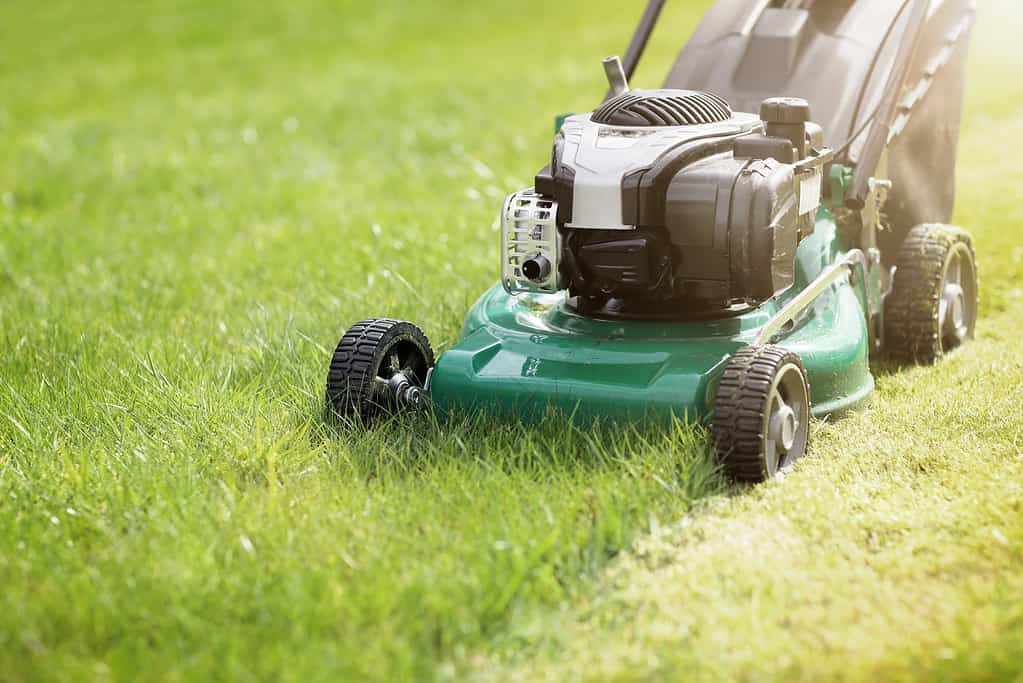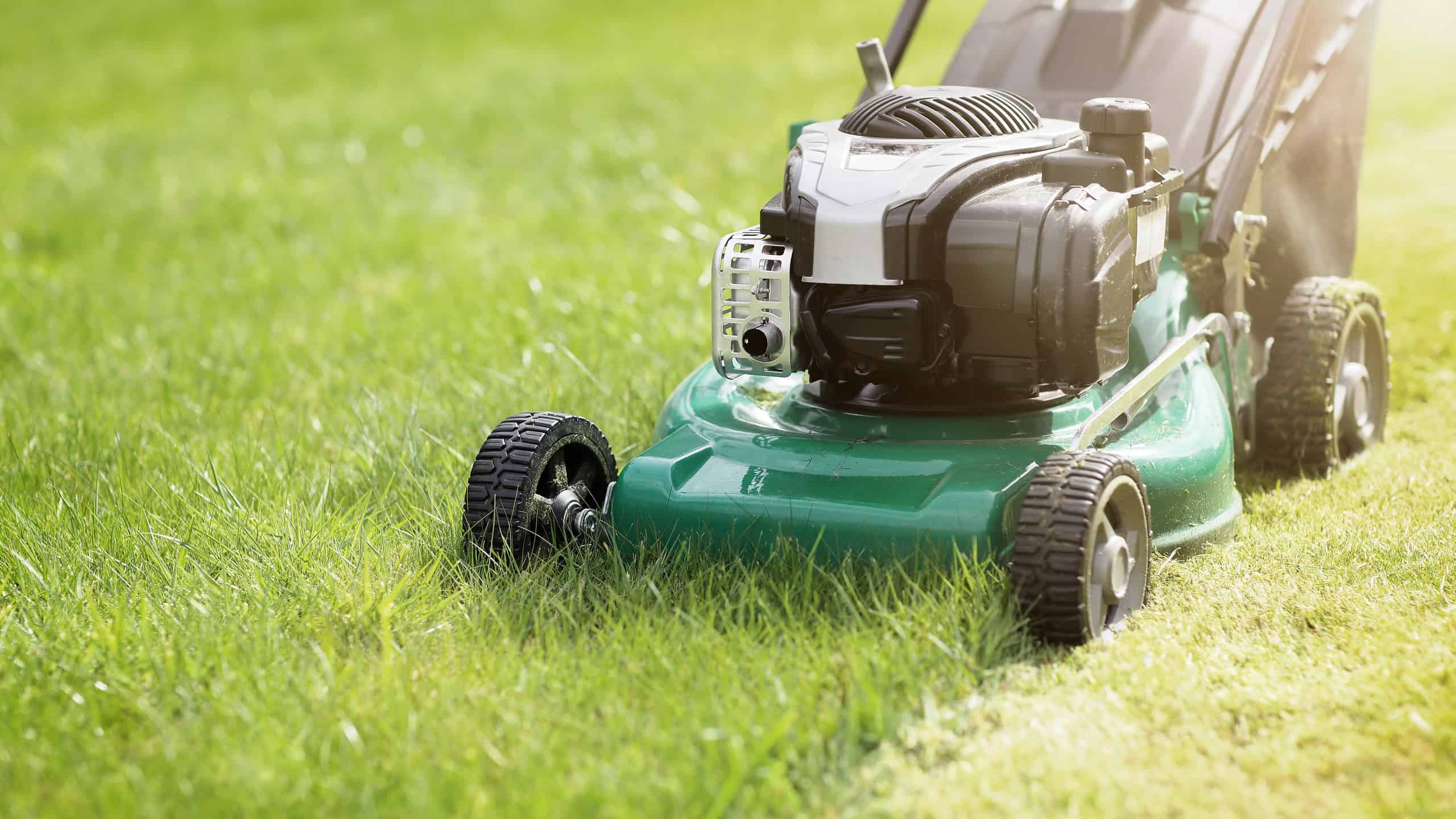
Amid the spring and summer months in most of the U.S., homeowners and renters with grass yards face the weekly chore of mowing their lawn. Decades ago, manual hand mowers dominated the market before being overtaken by gas-powered push mowers. Now, battery-powered push mowers have gained steam in the market based on their innovative attributes. With a quieter runtime, easier start, and lighter weight, many might assume that electric lawn mowers win out against gas-powered mowers.
However, gas-powered lawn mowers are far from obsolete. Keep reading to discover the seven unique advantages that gas-powered mowers have over battery-powered lawn mowers.
1. Offer Nuanced Performance

Gas mowers can cut longer grass for longer periods of time.
©iStock.com/BrianAJackson
Overall, gas mowers have a higher horsepower and better cutting efficiency which improves their ability to handle tough and overgrown grass with ease. Some lawn care professionals even believe gas-powered mowers provide a more professional-looking lawn finish.
2. Run Uninterrupted

Keep your gas-powered mower going to achieve the perfect height of grass.
©Mikhailov Studio/Shutterstock.com
Perhaps the most important thing gas mowers can do over a battery-powered motor is their near-unlimited runtime compared to a battery’s limitations. While it depends on the load you have the mower carry, a single full tank of gas can last anywhere from an hour and a half to several hours of mowing. Conversely, a battery-powered mower has a finite amount of time to work: between 45 and 60 minutes.
As long as a mower has the fuel to do so, it’ll keep going. This advantage remains especially important for large lawns and time-sensitive projects, where battery-powered mowers just can’t keep up. Oftentimes, an electric or battery-powered mower will stop mid-mow because of a low charge. Gas-powered mowers can run interrupted for well over an hour and have the durability to persist over stubborn patches of grass.
3. Have Convenient Fuel

Getting a gas-powered mower means you don’t need to worry about charging a battery to mow.
©iStock.com/Tomasz Klejdysz
While some critics ding gas-powered mowers for costing more on fuel, the convenience of readily-available gas makes using your gas-powered mower at any time easier than remembering to charge a battery.
Batteries for electric mowers cost anywhere between $20 to $74, depending on your battery-powered mower model. You’ll most likely want at least two to have uninterrupted mowing time.
4. Cut Larger Lawns

Gas mowers won’t run out of steam mowing a big yard like battery-powered ones will.
©1000 Words/Shutterstock.com
Another hefty benefit gas-powered mowers laud over battery-powered mowers is the ability to cut larger lawns consistently.
While some professional-grade electric mowers claim to have nearly two hours of charge time, that’s not the norm for residential mowers. For families with one or more acres to mow, a battery-operated lawn mower almost promises a break for recharging or switching the battery.
Instead, a gas mowers’ ability to handle extensive lawn areas without recharging breaks completes mowing tasks in one session.
5. Power Through Thick and Dense Grass

Thick grass is no match for a gas-powered mower.
©Yanti Lin/Shutterstock.com
For homes with thick or dense grass, a gas-powered mower is the no-brainer pick over a battery-powered mower. Most battery-powered mowers have smaller decks, less horsepower, and a harder time cutting through tough turf, while gas-powered mowers have the horsepower and torque to power through. Without getting bogged down, these mowers can maintain consistent cutting performance in challenging conditions.
6. Handle Heavy-Duty Jobs

Unruly yards need a gas-powered mower to look nice and professional.
©Virrage Images/Shutterstock.com
Compared to battery-powered mowers, gas-powered mowers have a much easier time handling tall grass, weeds, and brush efficiently. Because gas-powered mowers bring more horsepower and force to the job, they’re the clear pick over battery-powered counterparts to finish a heavy-duty job with ease. Electric mowers aren’t great for tough grass; their smaller catchall can fill up quickly — and when battery time is a concern, it’s doubly-annoying to mow fast and empty the bag with enough time to finish the job.
Gas-powered mowers are ideal for yards with irregular maintenance schedules as well. These machines can and will navigate the uneven grass lengths with ease while battery-powered mowers will struggle.
7. Mow Fast

Gas mowers have high speeds compared to battery mowers.
©Krasula/Shutterstock.com
Because battery-powered mowers have a lower threshold for tough grass, one may believe they’d mow short grass fast. Unfortunately for battery-powered mowers, that’s not the case.
Gas mowers’ higher mowing speed compared to battery mowers saves both time and effort for the user. With both mowers, you can dictate the speed — but you’ll get a faster, cleaner cut thanks to a gas-powered mower’s overall horsepower.
Battery mowers will start up fast and run quieter, but their battery length (or lack thereof) may motivate you to have a sloppier cut to ensure you don’t run out of charge before you finish your job.
Conclusion
For bigger yards, yards that have thicker grass, or families that need a reliable mower when they’re short on time, a gas lawn mower has the unique advantages to fulfill all their needs and more over battery-powered mowers.
If you’re ready to learn more about your lawn, find out the reasons you should stop mowing your lawn so often and some great alternative options to grass that you can grow in your yard.
Summary of 7 Things Gas Lawnmowers Do that Battery Mowers Can’t
| Number | Things Gas Mowers Do That Battery Mowers Can’t |
|---|---|
| 1 | Offer Nuanced Performance |
| 2 | Run Uninterrupted |
| 3 | Have Convenient Fuel |
| 4 | Cut Larger Lawns |
| 5 | Power Through Thick and Dense Grass |
| 6 | Handle Heavy-Duty Jobs |
| 7 | Mow Fast |
Thank you for reading! Have some feedback for us? Contact the AZ Animals editorial team.








